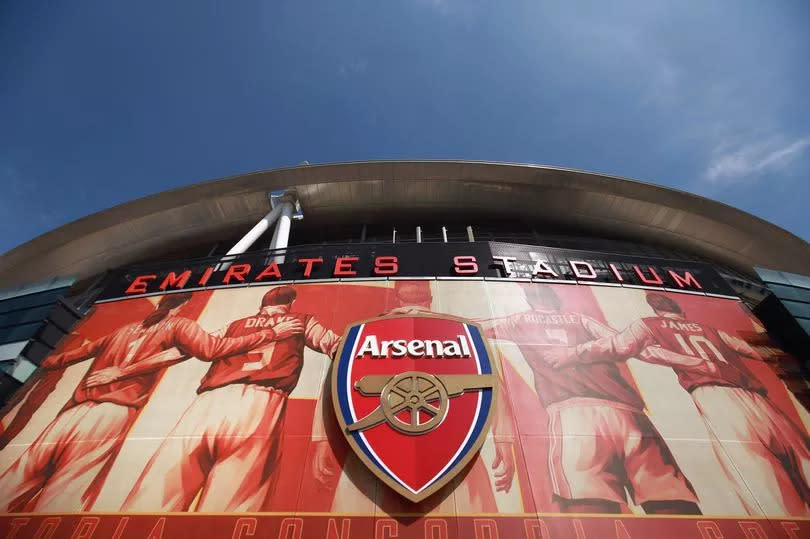What happened in Arsenal press box vs Man City explains landmark Emirates Stadium decision

When Arsenal welcomed Manchester City to Meadow Park last April, the overcrowding inside the stadium was so prolific that some spectators were forced to take in the action from the press box.
From a journalist's perspective, the environment was not particularly conducive to delivering high-quality work but it did prove, if proof were needed, that the Gunners had outgrown their Borehamwood home. Arsenal have played at the 4,500-capacity stadium for more than three decades, even opening a North Bank terrace - in homage to Highbury's iconic stand - in 2019.
But, in the wake of the Lionesses' success at the 2022 European Championships, a fanbase that was already the largest in the WSL exploded, with supporters suddenly clamouring to watch the likes of England captain Leah Williamson and Euros top-scorer Beth Mead turn out for the Gunners. Gone were the days of a few hundred people peppering the Meadow Park stands; demand for tickets began to far outstrip what the National League venue could supply.
It was little wonder, then, that Arsenal committed to playing at least five of their 11 Women's Super League (WSL) home games in 2022/23 at the Emirates. And the club's comprehensive marketing strategy - which included the conception of 'Home Advantage Packs', entitling fans to tickets for all five of those matches for £50 - has ensured Arsenal's partial move to the Premier League stadium has been a roaring success.
The Gunners have played six WSL matches in north London this season, with last month's clash with Leicester City a late addition, and have recorded an impressive average attendance of more than 32,000 - more than 10 Premier League clubs - across the campaign so far. They have twice sold out the Emirates and are now responsible for all of the division's top-five attendance records.
They are - in the words of Chelsea boss Emma Hayes - an "inspiration for the rest of the league" when it comes to getting bums on seats and have further cemented their trailblazer status by confirming the Emirates will be their primary residence from next term. In a statement on Tuesday, Arsenal announced that a total of 11 matches will be hosted at the iconic ground in 2024/25.
READ MORE: Vivianne Miedema: Arsenal's reluctant superstar who tore up the record books
READ MORE: Arsenal Women to make Emirates Stadium their home from next season
Eight of those games will be in the WSL and three in the Champions League, provided the team progresses to the group stages. Any knock-out home European games will also will be staged on the Emirates pitch.
"We have recently seen extraordinary growth in supporters coming to Emirates Stadium for games held here, which include two complete sell-outs this season." Vinai Venkatesham, Arsenal's chief executive, said of the club's landmark move.
"The next step in our journey is to make Emirates Stadium our main home for Arsenal Women. We are looking forward to giving more supporters the chance to watch our women's team play."
Perhaps the biggest compliment you could pay Arsenal is that this latest announcement does not come as a surprise. For years, cynics have sought to decry the appeal of women's game, insisting the sport will never be able to consistently attract the kind of substantial crowds we have grown so accustomed to seeing in the men's top flight.
The Gunners have made a mockery of those claims, proving that - with steady investment and a savvy marketing department - sell-out stadiums can be the norm, rather than the exception, for WSL clubs. And, it must be noted, it is no longer simply a case of trying to leverage some good PR.
Deloitte's Football Money League, which analysed 15 of the highest revenue-generating women's clubs in European football for the financial year ending in 2023, found Arsenal generated a revenue of €5.3million (£4.6m) last season. This represents a staggering 138 per cent year-on-year increase and sees the Gunners sitting fifth in Deloitte's rankings. These findings exclude revenue contributions from associated men’s clubs.
Even more impressive, though, is the fact that Arsenal recorded highest matchday revenue of all of the 15 clubs, with 58 per cent of their total revenue (€3.1m) generated on matchdays. When you consider only three WSL matches were hosted at the Emirates across the 2022/23 campaign, it's likely that this season's numbers will make for even better reading.
With former Arsenal and Chelsea forward Karen Carney recently forecasting that women's football will be a "billion-pound industry" in 10 years' time, the Gunners have put themselves in prime position to reap considerable financial rewards in the years ahead. Of course, ensuring the quality of the product is as good as the matchday experience is paramount is long-term success is the goal.
Arsenal, who are currently five points adrift of league leaders Manchester City, have underperformed this season, despite winning the Continental League Cup in March. They crashed out of the Champions League in the first qualifying round and failed to reach the last eight of the FA Cup. Certainly, manager Jonas Eidevall will know more is required from his team if they are to be vying for the game's top honours next term.
But Arsenal's latest milestone decision means the Gunners have been armed will all the necessary ingredients to prosper off the pitch. Now they must prove they are capable of achieving something special on it too.

